Tales from Planet Earth originated more than a decade ago as a film festival under the direction of Gregg Mitman, Vilas Research and William Coleman Professor of History of Science, Medical History, and Environmental Studies, UW-Madison.
Historically, the film series has tried to link compelling narratives to the work of scholars and community organizations advocating for environmental and social justice.
Past Films
This is an accordion element with a series of buttons that open and close related content panels.
2025: Mother: Sisterhood in the Wild
September 29, 2025
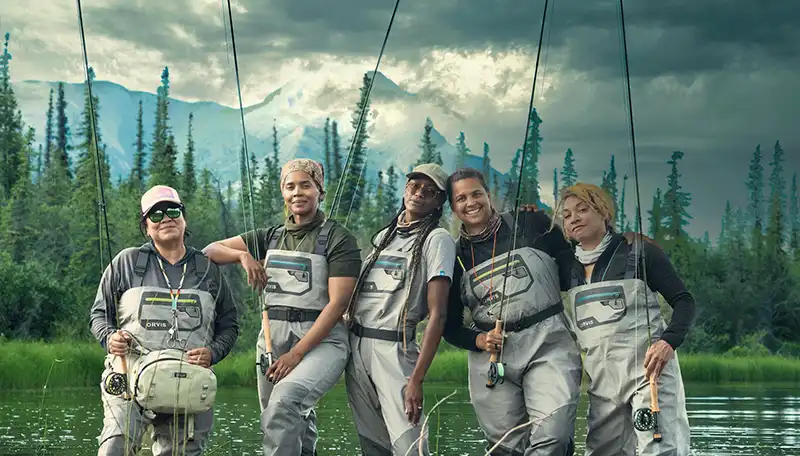
“How do I, as a BIPOC woman, fit into nature?”
“What role do women play in preserving our outdoor spaces?”
These are some of the questions explored in Mother: Sisterhood in the Wild, a documentary feature film by Chad Brown. Brown is a documentary-style portrait and adventure photographer, creative director and conservationist. He is also the founder and president of two nonprofit organizations, and a veteran of the U.S. Navy.
Brown’s work focuses on outdoor adventure travel and documenting threatened wild spaces. He connects the public to endangered areas by showing the true spirit of the people of these lands.
Event Partners
- Dane County Parks
- Foundation for Dane County Parks
- UW-Madison Department of Community and Environmental Sociology
2025: Wild & Scenic: 2024 Rewind
February 17, 2025
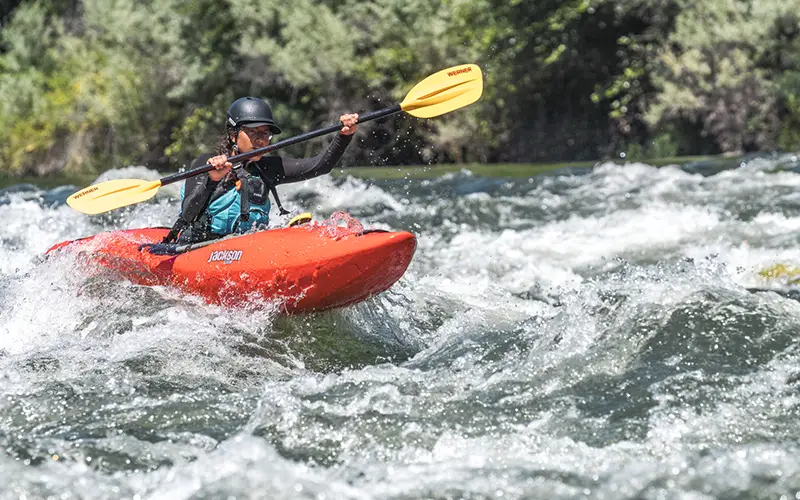
This event featured a special screening of six films from the 2024 Wild & Scenic Film Festival. A “film festival by activists for activists,” Wild & Scenic showcases stories that inspire environmental action and celebrate the beauty of our planet.
Originally a five-day event in California, the festival travels the country. Last spring, the tour partnered with the River Alliance of Wisconsin for a stop at Madison’s Barrymore Theatre.
Before the 2025 festival, the Tales from Planet Earth film series featured an exclusive “rewind” of six must-see films from 2024:
- Paddle Tribal Waters
- 6,000 Miles
- Chicas al Agua (Girls to the Water)
- INWARD
- Finding the Line
- Study Aboard
Event Partners
- UW–Madison partners:
- College of Agricultural and Life Sciences
- Division of Diversity, Equity and Educational Achievement
- Hoofer Outing Club
- International Division
- Latine Cultural Center
- Office of Sustainability
- Tribal Relations
- Water@UW–Madison
- River Alliance of Wisconsin
2024: Bad River
November 18, 2024
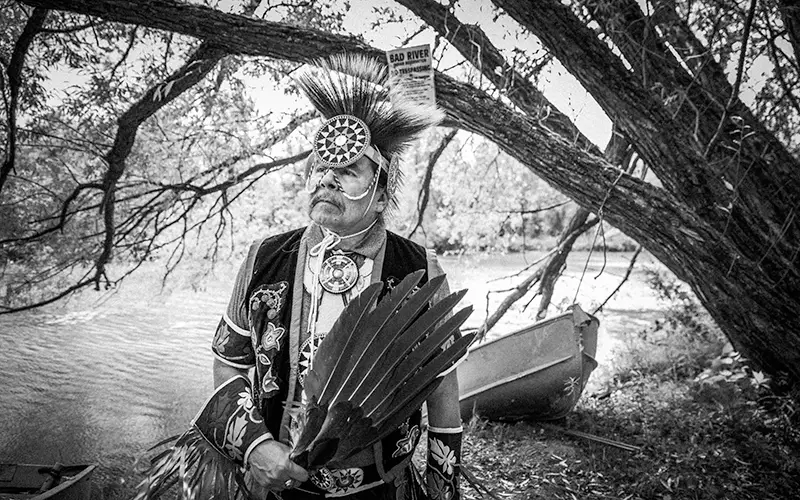
Bad River is a documentary that follows the Wisconsin-based Bad River Band on their continuous fight for sovereignty. The screening was followed by a moderated Q & A with some of the voices featured in the film.
Panelists
- Aurora Conley, vice chair of the Anishinaabe Environmental Protection Alliance and Bad River tribal member
- Misty Jackson, American Indian Science & Engineering Society coordinator, Madison Metropolitan School District
- Patty Loew, professor emerita at UW–Madison and Northwestern University, retired inaugural director of the Center for Native American and Indigenous Research at Northwestern University
This event was part of UW–Madison’s Native November programming.
Event Partners
- College of Agricultural and Life Sciences
- Department of Forest and Wildlife Ecology
- Great Lakes Indigenous Law Center
- Morgridge Center for Public Service
- Native American Center for Health Professionals
- Water@UW–Madison
- Wisconsin Union
- Wisconsin Union Directorate Film Committee
2024: An Invitation to Wonder - Waubesa Wetlands
September 30, 2024
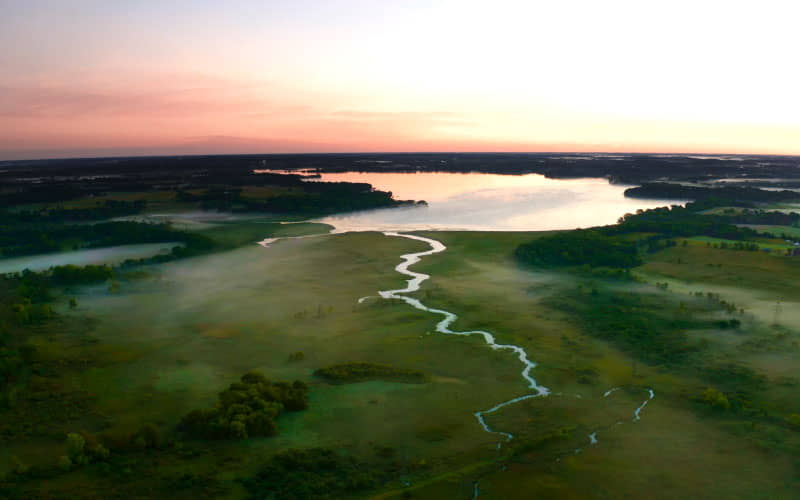
Guided by the wisdom of his grandfather Calvin (Cal) DeWitt, young filmmaker Ben Albert journeys through the mysterious world of the Waubesa Wetlands in this exploration of natural wonder and the intrinsic bond between humans and nature.
Navigating the challenges of this environment and learning from his grandfather – a wetland scientist who has lived on the marsh’s edge for over 50 years – Albert captures the wetland ecosystem in a new light. By combining Albert’s visuals with DeWitt’s knowledge and wisdom, the film uncovers the life, mysteries, and value of wetlands in a way never seen before.
The Nelson Institute’s Tales from Planet Earth film series hosted Ben Albert and Cal DeWitt as they engaged with the Madison campus and community, shared their experiences, and offered free screenings of An Invitation to Wonder: Waubesa Wetlands.
Partners
Event co-hosts:
- Dane County Parks
- Foundation for Dane County Parks
- Natural Resources Foundation of Wisconsin
Additional partners:
- BIPOC Birding Club of Wisconsin
- Wisconsin Department of Natural Resources
- Friends of Waubesa Wetlands
- The Nature Conservancy
- Rock River Coalition
- Save Our Songbirds
- Wisconsin Wetlands Association
2023: Blackwaters - Brotherhood in the Wild
September 16–18, 2023
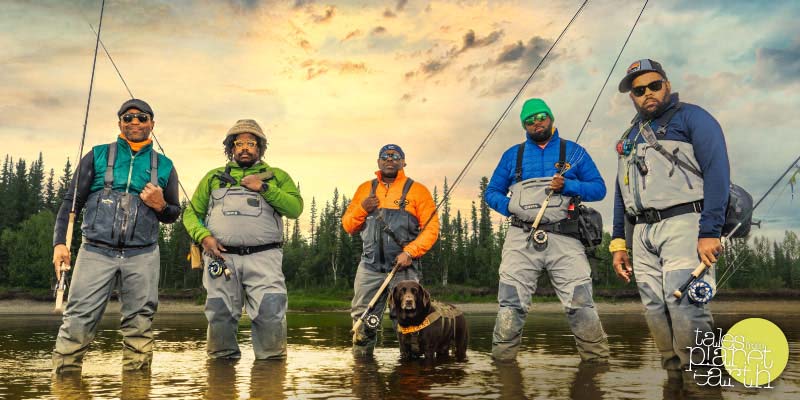
“Where do I, as a Black man, fit in nature?” “How do we hold space in nature for our next generation of young men?” These are some of the questions posed by the new documentary Blackwaters: Brotherhood in the Wild, which follows five men with five unique perspectives as they embark on a fly-fishing adventure in the Gates of the Arctic Circle National Park. For each of the men, nature has been a source of healing, and self-fulfillment and inspiration, particularly around the topic of representation in the outdoors.
The Nelson Institute’s Tales from Planet Earth film series hosted the cast of Blackwaters as they engaged with the Madison campus and community, shared their experiences, and offered free film screenings.
Contributing Partners
- Bradshaw-Knight Foundation
- Color in the Outdoors
- Dane County Parks
- Dean Health Plan
- Foundation for Dane County Parks
- Friends of Capital Springs
- Healthy Parks, Healthy You
- The Joy Trip Project
- UW-Madison Odyssey Project and South Madison Partnership
2023: A Voice for the Wild
March 7, 2023
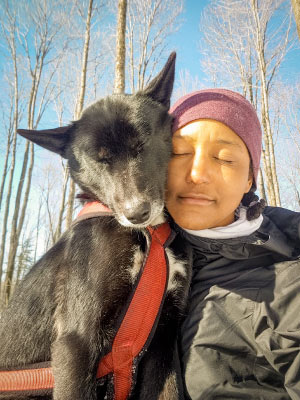
Fresh off her debut film, Breaking Trail (2021), winter backpacker and thru-hiker Emily Ford is back with a new documentary. Premiering at the prestigious Banff Mountain Film Festival on November 7, 2022, A Voice for the Wild documents Ford’s wintertime journey across Minnesota’s remote Boundary Waters Canoe Area Wilderness.
The Nelson Institute hosted Emily Ford as she visited Madison to engage with the Madison campus and community, share her experience, and offer screenings of Breaking Trail and A Voice for the Wild.
Ford is the first woman and person of color to have completed the entire Ice Age Trail in winter. Through her work, Ford spreads the message that everyone deserves to discover the outdoors, regardless of race, gender identity, or upbringing.
Ford shared her story at several events in the Madison area, culminating in the Nelson Institute’s Tales from Planet Earth film series screening at Union South’s Marquee Cinema on Tuesday, March 7. The event featured back-to-back screenings of Ford’s films, followed by a moderated Q & A.
Contributing Partners
- Bradshaw-Knight Foundation
- Color in the Outdoors
- Dane County Parks
- Dean Health Plan
- Friends of Capital Springs
- Foundation for Dane County Parks
- Healthy Parks, Healthy You
- Ice Age Trail Alliance
- Natural Resources Foundation of Wisconsin
- SSM Health
- The Joy Trip Project
- Wisconsin Hoofers
- UW-Madison Odyssey Project, Social Justice Hub, and South Madison Partnership
2022: Into the Okavango Film Screening and Discussion
April 20, 2022
Into the Okavango is a National Geographic Documentary Film that follows explorers on a four-month, 1,500-mile expedition to save the river system that feeds the wetland wilderness of the Okavango Delta in Botswana.
This Tales from Planet Earth Film Series event featured a special discussion with Steve Boyes, a National Geographic explorer and founder of Wild Bird Trust, and Nyambe Nyambe, the executive director of Kavango-Zambezi Transfrontier Conservation Area (KAZA TFCA) Secretariat. Boyes and Nyambe led a conversation about the efforts being made to protect the Okavango River Basin. They also shared more about the film and the ecological importance of the Okavango River Basin, which provides water to about one million people and is home to the world’s largest population of African elephants.
Speakers
- Steve Boyes, Founder of Wild Bird Trust; National Geographic Explorer
- Koketso Mookodi, Managing Director and Trustee, Botswana Wild Bird Trust
- Nyambe Nyambe, Executive Director, Kavango-Zambezi Transfrontier Conservation Area (KAZA TFCA) Secretariat
In Partnership with
- Bradshaw Knight Foundation and James and Renee Knight
- UW-Madison African Studies Program, International Division, and Wisconsin Union Directorate (WUD) Film Committee
2021: Breaking Trail Film Screening and Discussion with Emily Ford
February 7-8, 2021
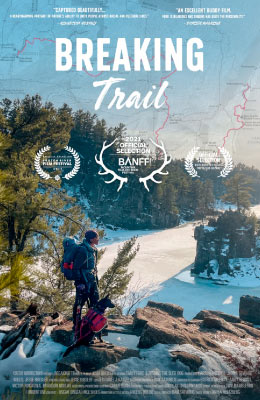
The Nelson Institute hosted a screening and discussion of the film Breaking Trail, which follows Emily Ford as she becomes the first woman and person of color to embark on a thru-hike, or point to point, of the Ice Age Trail in winter. This Tales from Planet Earth Film Series event featured a special discussion with Ford and James Edward Mills, Nelson Institute community partnership liaison. Together they explored Ford’s journey with her sled dog Diggins and the ways this experience tested their endurance, while also showcasing the unexpected kindness of strangers.
About Emily Ford
Emily Ford grew up in the suburbs of the Twin Cities, went to Gustavus Adolphus College, and promptly moved to Duluth, Minnesota, after finishing her geology degree. Moving to Duluth inspired her to get out and backpack (especially after getting her first pup, Zulu).
She is now the head gardener of the historic house museum, Glensheen. Since she is laid off for three months in the winter, she spends her time in the snow.
In the winter of 2020-2021, she completed the 1,200-mile National Scenic Ice Age Trail with her second dog, Diggins. She continues to get out in the winter hoping to break down barriers for other people of color in the outdoors.
Contributing Partners
- City of Madison Parks
- Madison Parks Foundation
- Ice Age Trail Alliance
- Wisconsin Hoofers Outing Club
- Bradshaw-Knight Foundation, Inc.
- UW-Madison Center for Culture, History, and Environment; Social Justice Hub; South Madison Partnership; Arboretum
In Partnership with
- The Joy Trip Project
- Color in the Outdoors
- Hike it Baby
2020: America's Forests with Chuck Leavell Wisconsin Episode Premiere and Panel Discussion
October 21, 2020
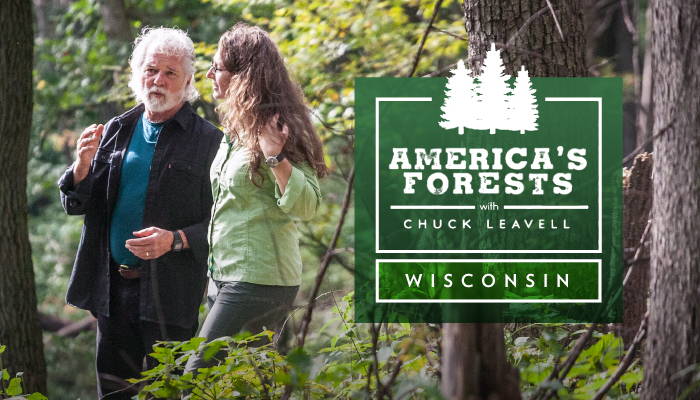
National TV program “America’s Forests with Chuck Leavell” traveled to Wisconsin in a multi-part series. Using the Wisconsin episodes as inspiration, this virtual premiere event was a rousing discussion with forest experts, professionals, and enthusiasts on the critical importance of well managed public and private forest lands in Wisconsin.
Panel Members
- Chuck Leavell, host of America’s Forests with Chuck Leavell
- Tony Ferguson, director of the forest products laboratory, USDA Forest Service
- Heather Berklund, Chief State Forester, Wisconsin Department of Natural Resources
- Buddy Huffaker, president of The Aldo Leopold Foundation
- Henry Schienebeck, executive director of the Great Lakes Timber Professionals Association
- Adena Rissman, associate professor of human dimensions of ecosystem management at the University of Wisconsin–Madison Department of Forest and Wildlife Ecology
The panel discussion was moderated by James Edward Mills, a journalist, media producer, and community partnership liaison at the University of Wisconsin–Madison Nelson Institute for Environmental Studies.
Presented in Partnership with:
- America’s Forests with Chuck Leavell
- Choose Outdoors
- U.S. Forest Service
- Great Lakes Timber Professionals Association
- Forest Industry Safety and Training Alliance Inc. (FISTA)
- The Joy Trip Project
- McCoy Construction and Forestry
- Ponsse
- Stihl
- The Nature Conservancy
- Red Wing Shoes
- Wisconsin Department of Natural Resources
With Support From:
Wisconsin Department of Natural Resources, Wisconsin Sustainable Forestry Institute, John Deere (McCormick), Aldo Leopold Foundation, Ruffed Grouse Society, National Forest Foundation, Menominee Tribal Enterprises, Wisconsin Urban Wood, University of Wisconsin and Harley Davidson.
2020: Youth Unstoppable: The Rise of the Global Youth Climate Movement
February 4, 2020
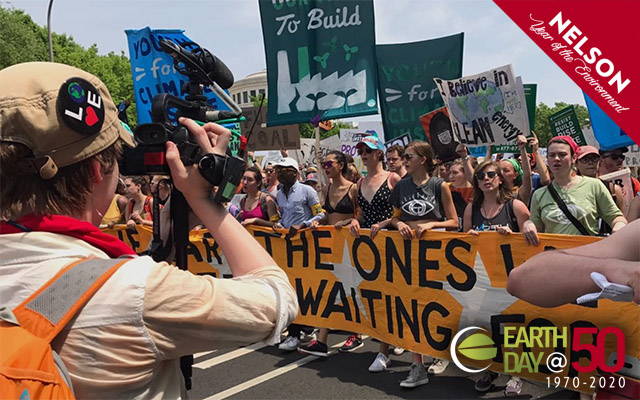
The Nelson Institute and its partners hosted a viewing and discussion of the film Youth Unstoppable. This film goes inside the rise of the Global Youth Climate Movement showcasing the ways in which youth are contributing to the conversation around climate change action.
Directed by Slater Jewell-Kemker, who was 15 when she began documenting the untold stories of youth on the front lines of climate change, this film premiered at Michael Moore’s invite only Traverse City Film Festival in 2018 and has gone on to win 13 awards.
This powerful film was followed by a discussion panel including:
- Paul Robbins, Dean, Nelson Institute for Environmental Studies
- Leaders from the Youth Climate Action Team (YCAT):
- Max Prestigiacomo, Founder and Organizer
- Stephanie Salgado, Founder and Executive Director; Member, Governor’s Task Force on Climate Crisis
- Ayanna Lee, Executive Director – State Lead
Presented in Collaboration with:
- Outrider Foundation
- Wisconsin Union Film Directorate
- Wisconsin Union Directorate Society and Politics
- Bradshaw-Knight Foundation, Inc.
- UW-Madison Center for Culture, History, and Environment
- UW-Madison Division of the Arts
- UW-Madison Havens Wright Center for Social Justice
2019: The Return of Navajo Boy
November 15, 2019
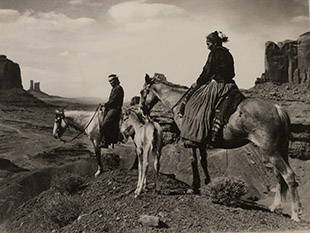 A 20th anniversary screening of the documentary film, The Return of Navajo Boy. A Sundance Film Festival and PBS selection, this documentary unlocks the mystery of a silent 1950s docudrama called “Navajo Boy” and exposes a hidden environmental crisis facing Navajo residents. This documentary tells the story of Elsie Mae Begay, who, while viewing the vintage film about her family in Monument Valley, identifies her baby brother who was adopted by white missionaries in the 1950s and never heard from again. She says his name is John Wayne Cly.
A 20th anniversary screening of the documentary film, The Return of Navajo Boy. A Sundance Film Festival and PBS selection, this documentary unlocks the mystery of a silent 1950s docudrama called “Navajo Boy” and exposes a hidden environmental crisis facing Navajo residents. This documentary tells the story of Elsie Mae Begay, who, while viewing the vintage film about her family in Monument Valley, identifies her baby brother who was adopted by white missionaries in the 1950s and never heard from again. She says his name is John Wayne Cly.
Elsie and her family’s story offers a different perspective on the history of the American West, showing the ways in which indigenous voices change the meaning of stereotypical images found in Hollywood Westerns, postcards, and, a propaganda film made by a uranium mining company. Against all odds, The Return of Navajo Boy, reunites a Navajo family and reveals the long-term legacies of radioactive contamination, all while uncovering the hidden history of the American West. A 15-minute epilogue follows the end credits.
A subsequent web series sponsored by the Bradshaw-Knight Foundation of Madison shows how this documentary triggered a federal investigation, the first EPA clean-up of an abandoned uranium mine in the Navajo Nation and a billion-dollar legal settlement.
A discussion featuring Navajo speakers highlighted the documentary’s lasting impact:
- James Adakai, President, Oljato Chapter, Navajo Nation
- Elsie Mae Begay, Navajo Nation
- John Wayne Cly, Navajo Nation
- Jeff Spitz, Director and Co-Producer, Groundswell Films
Presented in Collaboration With:
- Outrider Foundation
- Center for Culture, History, and Environment
- Bradshaw-Knight Foundation, Inc.
- Wisconsin Union Directorate Society and Politics
- Groundswell Educational Films
2019: Anthropocene: The Human Epoch
September 25, 2019
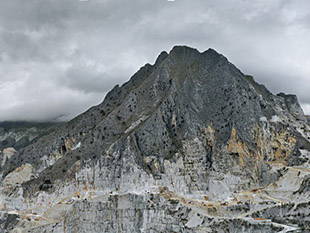 This film showcases the provocative and unforgettable experience of our species’ breadth and impact. The award-winning team of Jennifer Baichwal, Nicholas de Pencier, and Edward Burtynsky follows the Anthropocene Working Group, an international body of scientists who, after nearly 10 years of research, are arguing that the Holocene Epoch gave way to the Anthropocene Epoch in the mid-20th century, because of profound and lasting human changes to the Earth.
This film showcases the provocative and unforgettable experience of our species’ breadth and impact. The award-winning team of Jennifer Baichwal, Nicholas de Pencier, and Edward Burtynsky follows the Anthropocene Working Group, an international body of scientists who, after nearly 10 years of research, are arguing that the Holocene Epoch gave way to the Anthropocene Epoch in the mid-20th century, because of profound and lasting human changes to the Earth.
This free viewing was part of a nationwide screening event on September 25, 2019, that coincided with the U.N. Climate Action Summit in New York City.
Presented in Collaboration With:
- Outrider Foundation
- Center for Culture, History, and Environment
- Bradshaw-Knight Foundation, Inc.
- Wisconsin Union Directorate Society and Politics